Report #4
December 17, 2009
By David Simpson and Jane Lapiner
Civil Society is Exiled
Photo library at bottom.
At the Media Center I hook up my computer daily and establish a post from which I can foray out into a world so rich with plenary sessions, side events, press conferences and special appearances that all choices require several sacrifices. The neighborhood—the particular section of the table at which I regularly sit—seems to endure swings of ethnicity. Today I am surrounded by French-speaking journalists. Yesterday it was Eastern Europeans. There’s a small press core from Kenya that for an hour or so a day occupies space down the table right next to a Palestinian contingent.
It’s not a bad neighborhood all things considered. It could use a good coffee joint rather than the little nearby stand, replicated in form and content throughout the conference many times over, but let me not complain. It has a grace note or two, the morning croissants being a good one for a country boy whose usual early fodder is burnt toast.
People pretty much leave you alone here to your own thoughts and with your own notes. The only time I’ve been challenged by a neighbor was when a woman from a large DC daily asked Jane and me to be quiet because she had a deadline. We obliged but when the Kenyan group, on this occasion situated closer to us, got into a good mood a few minutes later and punctuated loud talk with raucous laughter, she was mum.
It is true to some degree that the Africans are in charge—not in the way that Americans act out power but in terms of their bearing, a stateliness of person and an apparent sense of mission that few others seem to retain with such tenacity. They come from places where modern civilities have a more tenuous grasp and even that is threatened. If this spirit is made manifest in one person, it is Sudanese minister, Lumumba Stanislaus-Kaw Di-Aping who is the chief negotiator for the G77 (the developing countries).*
The big protest today came and pretty quickly went, leaving some with a sense of sadness and abandonment. It started in Center Hall as a chant about taking back the power and bloomed into a march led by indigenous people from North, Central and South America. It was hard to make a count of how many people were involved, about the only criteria the press has for measuring success in such things. The reason it was hard to estimate was the photographers. All anyone could see was the mass of cameras bobbing along, held upright or on tripods floating over the heads of those chanting and supposedly in the lead. Pretty soon there was no center, just a conglomeration of people and cameras heading toward the main exit in a rush of noise and enthusiasm. The camera men were, for the most part, not chanting.
Once outside, the marchers hooked up with activists who had no access to the formal event or who had had their access denied over the past twp days as O Day approached (if O actually does show up) It got active for a while and some tear gas was shot, a few young folks clubbed and subdued, but not many and not for nearly long enough, alas.
A painful moment came at the gate after the rally. The police had almost entirely closed off the entrance that led back into the hall. Several hundred people were trying urgently to get in, some still in line from the morning’s process to get formal access. Others were NGO reps whose established access had been honored as usual in the morning before marching out later with the protestors. The police, apparently in retribution, were not letting them back in and the crowd was not happy.
If this indeed was the last gasp of effort to drive Copenhagen toward a strong resolution, we are in trouble. A bright note occurred toward the end pf the day when Evo Morales and Hugo Chavez spoke pretty much back to back, Morales in the big Press Briefing Room and Chavez a half hour later, to the entire Plenary.
Morales’ speech was the more memorable of the two. Given the incredible mass of high sounding rhetoric people here had been subjected to, all seemingly meant to distract us from the puny progress actually being made by a long line of UN officials and Heads of State, Morales words were a breath of fresh air. He started out by acknowledging the people out in the streets and sending his regards. He invoked Karl Marx, in this instance a quote about the terrible ghost stalking the grim streets—the ghost named Capitalism. He suggested that if the climate was a capitalist bank, the great governments of the world would have already saved it. Moreles called for a Climate Justice Tribunal to judge those who misuse the planet. (You can just see the U.S. Senate jumping on that bandwagon.) As for carbon marketing, he dismissed it outright saying that we should “stop making money off the disgrace of the planet.” And if that weren’t enough, he concluded by saying outright that we must “end the capitalist system to save the world.” He pointed out the fatal anomaly of the US spending $647 billion on Afghanistan while offering only $10 billion to help the developing counties collectively fight the effects of climate change.
Chavez spoke in similar terms, though, from my perspective, a little less sympathetically.
He condemned capitalism and invoked the sanctity of the earth. “Let not the earth become the tomb of humanity”, he concluded.
Together, the two speakers—both heads of state and as such, participants of irrevocable status—spoke in some way for the exiled NGOs. It was some small redemption for the harsh way that civil society had been almost entirely excluded from this conference.
____________________________________________
* Di-Aping has emerged as a powerful spokesperson for the African Group as well as the G77. He is tall and stately and emanates a passion as quiet as it is powerful. He speaks softly and thoughtfully. He first attacked the 2 degrees C warming maximum that most rich countries currently consider acceptable. He called global warming of 2 degrees “certain death for Africa”, a type of “climate fascism” imposed by high carbon emitters. He said Africa was being asked to sign on to an agreement that would allow this warming in exchange for $10 billion, and that Africa was also being asked to “celebrate” this deal. “Ten billion dollars,” he said, “ought to be enough to buy Africa coffins.”
Click on photos for larger images
Previous: Copenhagen (COP15) Report #3

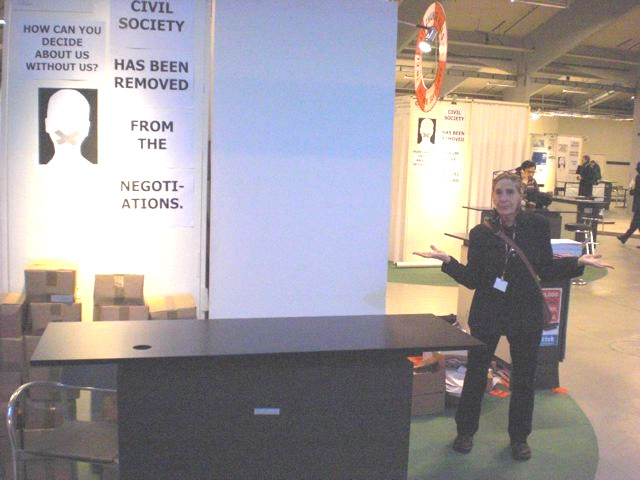
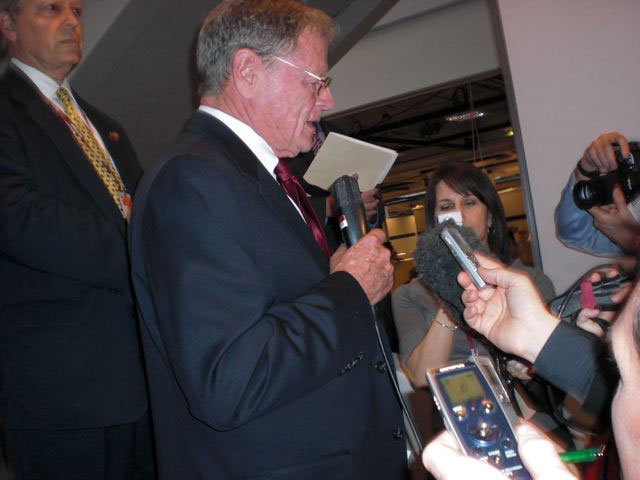
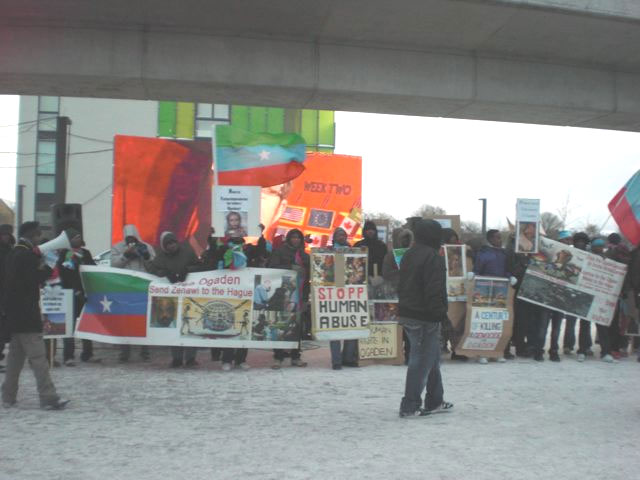
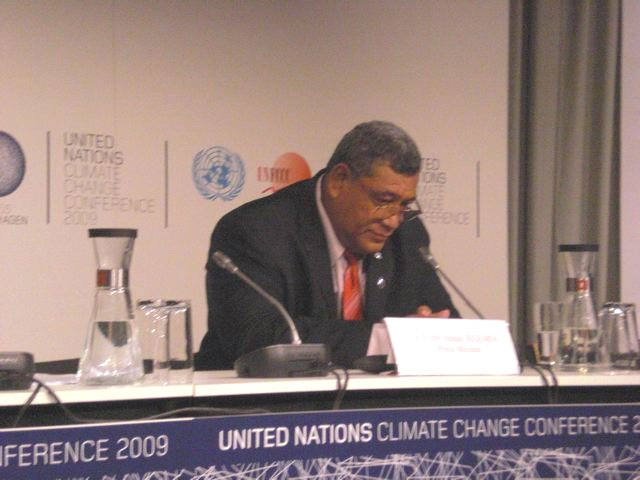
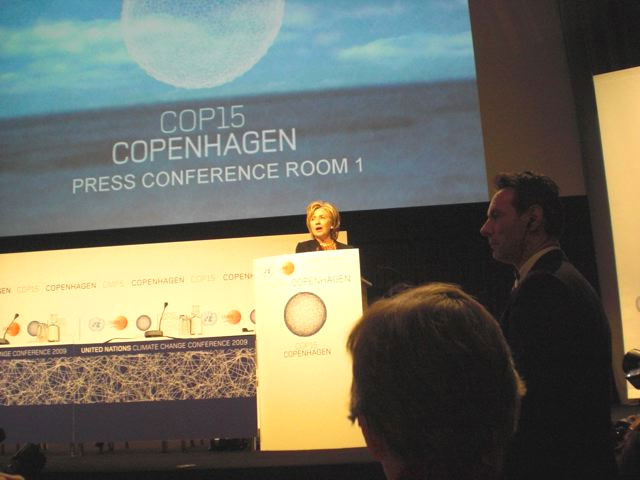
Reader Interactions